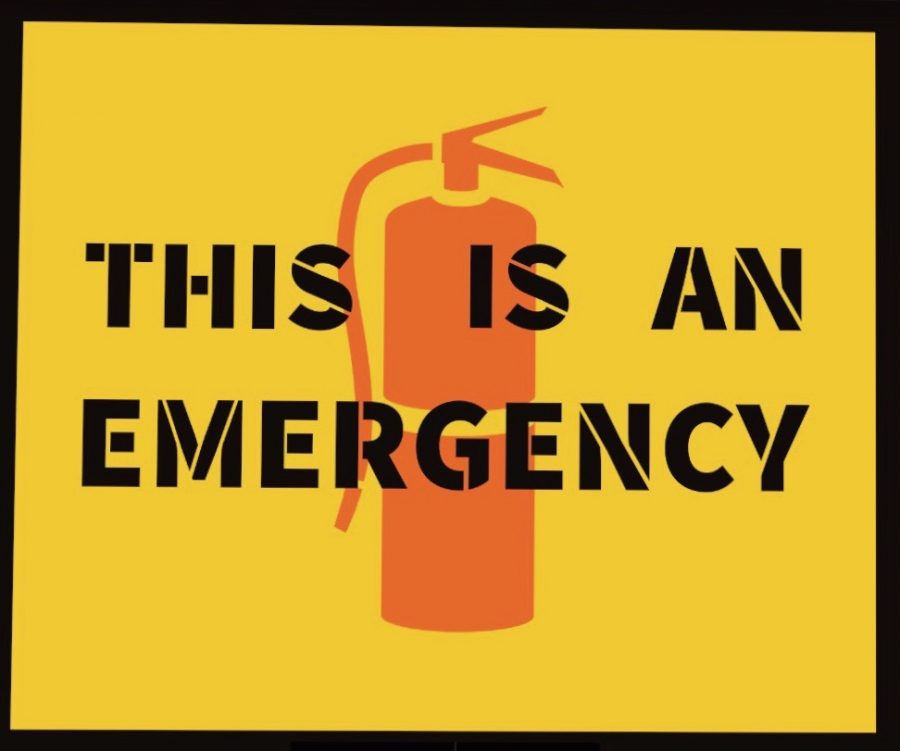Horwitz: This is an emergency
December 6, 2019
In his 2016 work “Who Rules the World?” Noam Chomsky theorizes that, “As long as the general population is passive, apathetic, diverted to consumerism or hatred of the vulnerable, then the powerful can do as they please, and those who survive will be left to contemplate the outcome.”
After initially realizing in the 1970s that their practices would have drastic effects on our planet’s environment, ExxonMobil began funding the massive disinformation campaign responsible for the widespread climate denial of the last few decades. As the dire consequences of our mistreatment of the planet have become clearer, the early deniers have transitioned to a practice journalist Christian Parenti refers to as the “politics of the armed lifeboat.” That is, those with plentiful resources believe they will be able to buy their way out of the impending climate catastrophes, leaving everyone else to suffer the consequences.
As a result, the climate crisis has grown the market for disaster capitalism. We have seen the wealthy in California hire private firefighters to protect their property during wildfires and bottled air is now sold in India as a treatment for the polluted environment. As resources and habitable land become scarcer, we will increasingly see our basic necessities auctioned off to those who are able to afford them, ultimately creating a climate apartheid.
Climate activist and author Naomi Klein writes about how our profit-oriented priorities perpetuated by neoliberalism and market expansionism are in direct contradiction with the laws of nature, which cannot be regulated by any individual, no matter their net worth. The mantra of everlasting growth and free markets contextualize the impending climate catastrophe among other challenges of our time.
In the words of Washington Gov. Jay Inslee, “The climate crisis is not a single issue. It is all the issues.” As a country and a world, many of our greatest challenges—gun violence, the opioid crisis, lack of affordable healthcare and housing, economic insecurity, racism, xenophobia and so forth—all stem from a prioritization of elite interests. As we struggle with these injustices, select corporations, countries and individuals accumulate massive amounts of wealth and power. They have done so, in part, by dividing the rest of us as part of a for-profit fearmongering scheme. The powerful create tensions along every exploitable line, including race, gender, sexual orientation, religion and socioeconomic status, to keep the blame for an increasingly stratified society off the true culprit: themselves.
Furthermore, elites’ and corporations’ disproportionately large role in polluting burdens those who are bearing the brunt of the climate crisis—those who have done the least to contribute to our current situation. Just 100 companies worldwide are responsible for about 70 percent of global emissions. We are left—after years of inaction and mistreatment—with no other option but to radically transform our society.
I first decided to get involved with the Sunrise Movement because they recognize the existential threat of the climate crisis, but also view it as an opportunity to build a sustainable economy and society for all by holding fossil fuel corporations and elites accountable, as well as any politicians which may be in their pocket. Furthermore, they recognize the interconnected nature of the problems we face and have proposed the only solution that matches the scope of the threat: The Green New Deal (GND).
New Consensus, the organization helping promote and implement the GND, summarizes the plan into five main goals, to “achieve net-zero greenhouse gas emissions” while ensuring a just transition, adequate working conditions, functioning infrastructure and access to resources to promote justice for all, especially among vulnerable communities.
To those who dismiss the GND as impossible to achieve, deride it as “too radical” or ask how we are going to pay for it: We have seen comparable levels of national collaboration before in times of crisis. The post-depression enactment of Franklin D. Roosevelt’s New Deal and the economic mobilization surrounding World War II are proof that we have the ability to overcome the greatest threat humanity has ever faced. There is nothing radical about having clean air to breathe and water to drink, the availability of good jobs and a livable wage, a sustainable planet to call home and a just, equal society for the people we love.
Yes, the GND will come at a cost; instead of funding endless wars overseas, bailing out big banks and giving massive tax cuts to large corporations, we will finally put our tax dollars towards our future. In fact, the cost of inaction will be far greater as we futilely attempt to rebuild from increasing extreme weather and account for millions of climate refugees. The GND gives our generation the chance to change the course of history or be responsible for writing its last chapter.
Whistleblower Edward Snowden postulates that, “The true measurement of a person’s worth isn’t what they say they believe in, but what they do in defense of those beliefs … If you’re not acting on your beliefs, then they probably aren’t real.” However, the reality one faces as they try to find the confidence to stand up for personal truths can be quite messy. It can be a struggle to find a means of expressing ourselves when we constantly learn to incentivize classism; our media has aided in fetishizing the idea of “electability” and imposes the idea of “politics” as abstract instead of recognizing it as sets of decisions that affect every aspect of our daily lives.
Today, Sunrise CWRU, the campus hub of the Sunrise Movement, is striking in solidarity with young people and adults all across the U.S. and the world to demand that transformative action is taken to address the climate crisis. We cannot accept any more inaction or middle-ground solutions. We unapologetically demand a GND, and continue to fight to ensure respect of indigenous land, environmental justice, protection of biodiversity and sustainable agriculture.
Our action today is not only an opportunity to take a united stand for our future, but also an opportunity to grow our power. This strike offers an opportunity for anyone concerned about their future yet unsure how to get involved. This movement welcomes anyone who desires to protect the air we breathe, the water we drink, the people we love and the places we call home. Polling already shows that we already have public opinion on our side; it is time we turn that support into power.
Achieving necessary change will only occur if we combine our existing influence with political pressure and power. It is imperative that we call on each presidential candidate to publicly commit to breaking the Democratic National Committee’s rules and participate in a climate debate—in addition to declaring the enactment of the GND as their top priority if elected President. We must demand that each member of Congress take the GND pledge and reject fossil fuel contributions on the campaign trail. Our success will also depend on action at the state and city levels. We must insist that local politicians back the federal GND while also passing localized versions that specifically address the needs of their communities.
We no longer have time to tolerate our political leaders merely claiming to support policy. True allyship must include actively fighting alongside us and using their platform to highlight how the climate crisis is destroying lives and livelihoods every day we fail to act. Let today be a warning to any politicians who believe they can continue to put their priorities over ours: We will vote you out.
Our resolve for change extends beyond politicians. Case Western Reserve University’s Climate Action Plan does not adequately reflect the urgency of the battle we face. Its stated goal is for our campus to reach net-zero emission by 2050, the same year our entire planet must reach this goal. At the time of its enactment, President Barbara Snyder said, “To say this goal is ambitious represents the height of understatement. But this institution will not embrace anything less.” I contend that since other, larger universities have adopted far more ambitious goals, either President Snyder’s $1 million-plus yearly compensation allows her the privilege to overlook the need for action, or there needs to be a serious re-examination of the University’s motto of “thinking beyond the possible.”
To President Snyder and the board of trustees: It is your duty to officially recognize a climate emergency, replace the university’s Climate Action Plan with one that truthfully acknowledges the scope of the crisis we face, divest CWRU’s endowment from the fossil fuel industry and reinvest in renewable energy. Otherwise, you will have staked yourselves on the side of greed and against the future of humanity.
It is imperative that we deliver an unmistakable message to every leader—if you are not prepared to take the necessary steps to guarantee a livable future, you are not deserving of the position you hold. It’s time to step up or step aside. No amount of profit can buy us out of the reality we face should we fail to address the climate crisis.
We must stand united against those who seek to divide us and live out the final principle of the Sunrise Movement: “We shine bright. There are hard and sad days, to be sure. This isn’t easy work. But we strive to bring a spirit of positivity and hope to everything we do. Changing the world is a fulfilling and joyful process, and we let that show.” Let us not leave future generations to suffer the consequences of our inaction nor allow our generation to have its legacy be passing up humanity’s last chance to save itself.
This is an emergency. Let’s act like it.



